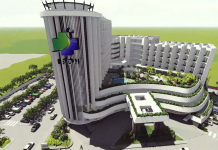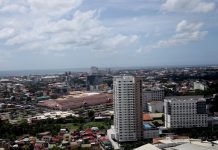Sourcing out of potable water for the tens of thousands of consumers of Davao City is nearing fulfilment as Apo Agua Infrastructura, Inc. is going full swing on its preparatory operations that will include pre-construction works by the middle of this year.
“Acquisitions of permits are almost complete and by the middle of this year Apo Agua will proceed with its preconstruction operations,” said Cirilo C. Almario III, general manager of Apo Agua.
The company will undertake most of the P12-billion Davao City Bulk Water Supply Project of the Davao City Water District.
The project will tap the water resources of Tamugan River. The works will include the construction of weir and intake structure, raw water transmission lines, water treatment plant, hydroelectric power plant and treated water transmission lines.
Apo Agua is investing P10 billion to complete the construction works while the DCWD is pouring some P2 billion for the laying of new giant pipes from its reservoirs down to its distribution lines in various areas of Davao City.
Apo Agua is a joint venture of Aboitiz Equity Ventures (AEV) and JV Angeles Construction Corporation (JVACC).
AEV holds 70 percent stake of the venture, 30 percent for JVACC. The joint venture had already signed a Bulk Water Purchase Agreement with the DCWD to provide 300 million liters per day (300 MLD) of potable water in a period of 30 years to DCWD consumers in Davao City.

Efficient water sourcing
Almario described the joint venture project as the most efficient and effective sourcing of potable water for Davao City consumers.
DCWD is currently dependent on ground water sources tapped through electric-powered pumps, he added.
The system, he said, is expensive and can be affected during power interruptions.
The DCWD reportedly spends close to P400 million is electric bills annually in pumping out water from the Dumoy aquifers.
This much can be saved by DCWD annually once the bulk water project starts.
With such limited system of sourcing out water, only 61% of population of Davao City is serviced by the DCWD while water production in the city only increased by 3.5 percent per annum over the past five years.
Davao City is growing fast as investments are pouring in since last year and the demands for potable water also increase.
Ground water is not a sustainable source to cope with the increasing demands given that it will recede fast over years of consumption.
Apo Agua offers more sustainable option to source out potable water for Davao City as its main source, the Tamugan River, regularly registers a 12 cu.m./sec water flow, a volume enough to supply the number of liters of water stipulated in the agreement.
The project, Almario said will start from the construction of a weir in Barangay Tawantawan. A weir is a low dam that will be built across Tamugan River to raise the level of water for its diversion towards an intake facility and the water treatment plant.
Strong flows of waters from the weir down to the intake facility will also be utilized to operate a 2MW hydroelectric power plant that will energize the water treatment plant.
“The project will have its own source of power via a hydroelectric plant that will be utilized in the process of treating the sourced out water before releasing it towards the reservoirs of DCWD,” Almario said.
A total of eight reservoirs of DCWD will be served by Apo Agua – to include the reservoirs in Calinan, Tugbok, Talandang, Mandug, Panorama, Panacan, Indangan and Cabantian.
The reservoir in Panorama, that supplies most of the heavily populated areas in Davao City will receive more of the supply of water from Apo Agua – or 220 MLD while the rest will be supplied with 80 MLD.
2019 target
Full project construction will commence by the last quarter of this year until its target completion by 2019.
“Only a few documents are permits are being processed right now. Upon completion of these permits by June or July, we will immediately proceed with the pre-construction works and full construction work of the project,” Almario pointed out.
The project Environmental Compliance Certificate from the Department of Environment and Natural Resources was already approved last week.
This March, it is expected that the Sangguniang Panlungsod of Davao City will compete its two public hearings while the City Planning and Development Office has already endorsed the application of Apo Agua to the Davao City Local Zoning Board.
Permits and certifications from the Department of Agriculture and the Department of Agrarian Reform are also being processed and expected to be completed by June of this year.
“We are optimistic that all the requirements will be completed by mid 2017. This project is very important as this will solve the problems of DCWD,” Almario said.
The project, he added, will allow service coverage of DCWD to expand to address the non-covered demands and provide the consumers with high-quality treated water.




